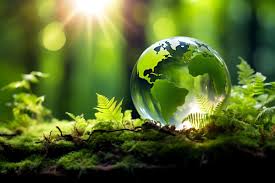
पर्यटन Challenges environmental
We live in a world where every second newspaper headlines the increasing temperatures, depleting natural resources, crippling rate of species extinction, and rising pollution. These problems are more than just headlines; we are facing the biggest crisis of the modern era: environmental degradation.
A saying goes, “We don’t inherit the earth from our ancestors; we borrow it from our children.” We are passing on a once blue and green planet that has been converted into a polluted concrete wasteland to our children. Humans have cut down forests to build skyscrapers, destroyed natural vegetation to construct highways, emptied rivers to have homes, and still have not stopped. Our greed has led us to a war against our future.
The current situation of our environment is alarming, to say the least. It is estimated that over five billion species have died out, global warming due to CO2 emissions has increased by 50% since 1990, our oceans have become a giant waste dump of plastics and fuel spills, and 90% of humanity breathes polluted air. We are all only a few bad choices away from losing our planet.
Homo sapiens moulded this planet to suit their needs, but we often forget that we live in an ecosystem with many other species. Due to environmental pollution, animals are suffering from habitat destruction, loss of food resources, and distorted reproductive cycles. For example, sea turtles are extremely sensitive to temperatures to the extent that the sex of their offspring is determined by the temperature of the sand they are laid on.
This is being affected due to increased oceanic temperatures, and they are also at risk of losing their eggs due to flooding. The Arctic is melting at a rate twice as fast as the global average, which puts animals like polar bears, snow leopards, and seals at risk of going extinct. Plant species are also getting destroyed due to deforestation, increased pollution, and the introduction of invasive species. We are answerable to all of this. This is not just about the extinction of species; it’s about ruining the delicate balance of our ecosystem.
We are at the cusp of destruction. This modern era crisis requires immediate reform. Barack Obama once said, “We are the first generation to feel the impact of climate change and the last generation that can do something about it.” One option is to succumb to the situation and continue living in our bubble of negligence, which really isn’t an option. The other is to mitigate, to resolve, to improve, to fight, and to sustain. Even a small contribution on our behalf can make a difference.
We can start with acceptance; it is important to acknowledge that we have been taking our planet for granted, and the second step should be to stop doing that. Small changes made at a personal level can have a massive impact.
For example, one should opt for public transportation over a private vehicle whenever possible, carry cloth or reusable bags instead of plastic ones to reduce plastic waste in the environment, have plants inside or outside our homes and encourage the same in our areas to help combat heat islands, ensure that all leakages are fixed to avoid water wastage, and switch off electric appliances whenever not in use. Our biggest weapon in today’s time is social media.
We should use it to educate others about the environment and actively talk about environmental issues and ways to improve them. Through social media, we also have the power to hold those responsible accountable. Being environmentally conscious and constantly promoting the same is our civic duty. We might belong to different genders, castes, or creeds, but we all have one thing in common: our planet and must do everything in our capacity and beyond to conserve it.
Furthermore, our enthusiasm can compel those in authority to make sustainable decisions. We can encourage the use of renewable resources and support research for environmentally better technologies and products. We must push lawmakers to enact strict environmental laws and demand reforms. We need to bring change across all sectors; educating farmers about sustainable agricultural practices like crop rotation, natural pest management, and desalination is crucial.
We also need to ensure that no industry discharges waste without proper treatment and that illegal mining is shut down. Moreover, we need laws and policies that ensure the safety of marine ecosystems and stricter regulations against hunting and poaching of animals. We have to be the voice for the voiceless and promote conservation societies, wildlife sanctuaries, and national parks. Joy Adamson rightfully said, “Man can rebuild a pyramid, but he can’t rebuild ecology, or a giraffe.” This urges us to act before it gets too late.
Some might argue that all of this could interfere with development, but that isn’t true. We need to develop sustainably, such that the needs of the present are fulfilled without compromising the ability of future generations to meet their own needs. As Mahatma Gandhi had said, “The world has enough for everyone’s need, but not enough for everyone’s greed.”
In conclusion, there cannot be enough emphasis on the fact that our biggest crisis, environmental degradation, will lead to our destruction if not steadily acted upon. A few years from now, our children will not care about our shiny cars or large houses if we cannot even provide them with clean air to breathe. We can act now or apologize later.
By: Hansika Sinha
Write and Win: Participate in Creative writing Contest & International Essay Contest and win fabulous prizes.


